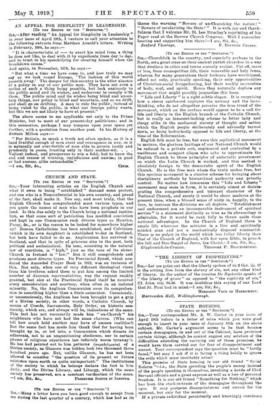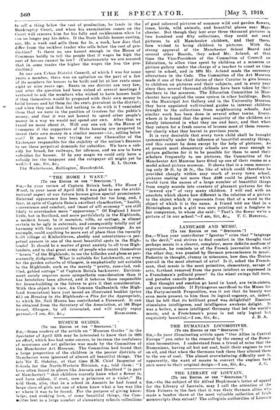STATE HOUSING.
[To THE Enrroa or THE " SPECTATOR."] SM.—Your correspondent Mr. A. W. Carter in your issue of April 19th 'refers to a letter of mine which you were geed enough to insert in your issue of January 18th on the above subject. Mr. Carter's argument seems to be that because certain demagogues, in and out of the Cabinet. have promised certain things, although he cannot suggest any solution of the difficulties attending the carrying out of those promisee, he would have them carried out for fear of disappointment and unrest. Your correspondent says the question must be "boldly faced," but may I ask if it is facing a thing bold)) to ignore the evils which must inevitably arise?
This promise of State housing is our old friend " Social Reform "—i.e., the State spending the people's money instead of the people spending it themselves, involving a horde of Civil Servant officials and a great expense as well as a loss of personal freedom. It is our old friend "Something for Nothing," which has been the stock-in-trade of the demagogue throughout the ages. It may postpone disappointment and unrest for the moment, but only for the moment.
If a private individual persistently and knowingly continues
to sell a thing below the cost of production. he lands in the Bankruptcy Court. and when his examination comes on the Court will censure him for his folly and recklessness when 1.e can no longer pay his debts. If the State builds houses costing, say, 12s. a week and sells them for Ss. a week, how does that differ from the recklesi trader who sells below the cost of pro- dilation? Is there no one honest enough in the House of Commons boldly to tell the people that if wages be high the cost of houses cannot be low? (Unfortunately we are assured that in some trades the higher the wages the less the pro- dilation.)
In our own Urban District Council, of which I was for some years a member, there was an agitation on the part of a few of its members for houses to be built and let at low rents some eight or nine years ago. Rents in our district are very low, and after the question had been raised at several meetings I ventured to ask the members who wished to have houses built if they themselves would be prepared with their own money to build houses and let them for the rents prevalent in the district; and w hen they said that had nothing to do with it I reminded them that we were in the position of trustees for the public's money, and that it was not honest to spend other people's money in a way we would not spend our own. • After that we heard no more about it. Will any one ask in the House of Commons if the supporters of State housing are prepared to invest their own money in a similar manner—i.e., selling below rest? It must be very trying for any Chancellor of the Exchequer responsible for the stability of the nation's finances to see these perpetual demands for subsidies. We have a sub- sidy for bread, for railways, for idleness, and we are to have subsidies for houses. If by any magic we could only have a subsidy for the taxpayer and the ratepayer' all might yet be well:—I am, Sir, Ac.,E. L. OLIVER.
The Waterhouse, Bollington: Macclesfield.



































 Previous page
Previous page